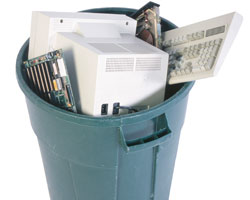

 By Brian D. Anderson and Gretchen E. Cleveland, Whyte Hirschboeck Dudek S.C., Madison
By Brian D. Anderson and Gretchen E. Cleveland, Whyte Hirschboeck Dudek S.C., Madison
Jan. 6, 2010 – By enacting the E-Cycle Wisconsin program into law in October 2009, Wisconsin joined more than 20 other states that have already passed comprehensive laws to regulate the collection and disposal of electronic waste, commonly termed “e-waste.”
E-Cycle Wisconsin’s first program year begins Jan. 1, 2010, with certain of its requirements phasing in thereafter. Among other things, the legislation requires proper collection and recycling of e-waste, and bans landfill disposal or incineration of certain electronics.
Passage of the Wisconsin law comes in the wake of revelations regarding the illegal shipment of e-waste to Africa and China as described in, among other places, a New York Times article and a PBS Frontline report.
These and related reports reveal that millions of tons of e-waste are shipped annually to Africa and Asia, leading to the creation of vast “e-waste cities” where workers, often children, disassemble parts containing lead and other toxic substances. Aside from the obvious environmental and public health concerns, there are reports of criminals scouring hard drives in order to exploit bank, credit card, and other personally identifying information.
The Wisconsin law will address some of these problems by creating a system of mandatory labeling, registration, recycling, and reporting that applies to manufacturers, retailers, collectors, and recyclers. It also includes a system of financial incentives and penalties. Under the law, the Wisconsin DNR is tasked with coordinating the registration of manufacturers, collectors, and recyclers, as well as the collection and monitoring of required reports on the amount of e-waste being collected and recycled.
The law’s key terms and obligations are summarized below:
Covered Electronic Device: Covered Electronic Devices (CEDs) include video display devices, computers, and printers.
Eligible Electronics Device: Eligible Electronics Devices (EEDs) include CEDs, as well as keyboards, fax machines, TVs, VCRs, and DVD players.
E-Waste: E-waste is an EED that has been disposed of.
Manufacturers: The law defines a manufacturer as those who build, license, or sell CEDs under their own brand. Manufacturers must comply with registration and reporting requirements, and are heavily responsible for ensuring that their products are recycled properly. In addition, manufacturers are charged with meeting designated recycling targets; manufacturers exceeding these targets can earn recycling credits to apply toward future targets, and manufacturers failing to meet these targets must pay shortfall fees. Finally, manufacturers must satisfy labeling requirements demonstrating that they are properly registered under Act 50.
Retailers: The law defines retailers as those who sell CEDs to homes or schools. Though retailers aren’t subject to registration and reporting requirements, they can only sell new CEDs made by properly registered manufacturers. Retailers are also required to educate consumers about e-waste recycling and the incineration and landfill ban.
Collectors: The law defines collectors as those who receive EEDs from consumers and delivers them to recyclers. Collectors must comply with registration and reporting requirements, and can only work with properly registered manufacturers and recyclers. They must also track the amount of e-waste collected from each manufacturer and delivered to each recycler.
Recyclers: The law defines recyclers as those who receive EEDs from consumers and collectors for recycling. Recyclers must comply with registration requirements, and have heavy reporting requirements. In particular, recyclers must keep track of what happens to the e-waste after received at their facilities, including the amount of e-waste that’s incinerated, placed in a landfill, or delivered to a third party for manufacturing or reuse. Recyclers must also demonstrate proof of financial responsibility, maintain liability insurance, and develop plans addressing environmental hazards.
Consumers: Under the law, consumers include households and schools. They are mainly responsible for cooperating with recycling efforts, and must comply with the landfill and incineration ban.
Landfill and Incineration Ban: Under this ban, consumers are prohibited from incinerating or otherwise improperly disposing of EEDs and cell phones (which are not otherwise subject to E-Cycle Wisconsin).
Registration forms are now available on the DNR Web site.
Brian Anderson and Gretchen Cleveland are attorneys with the Madison office of Whyte Hirschboeck Dudek S.C. They are members of the firm’s corporate and real estate groups. Anderson’s experience includes representing an e-waste collector and negotiating contracts governing the shipment and processing of e-waste.
